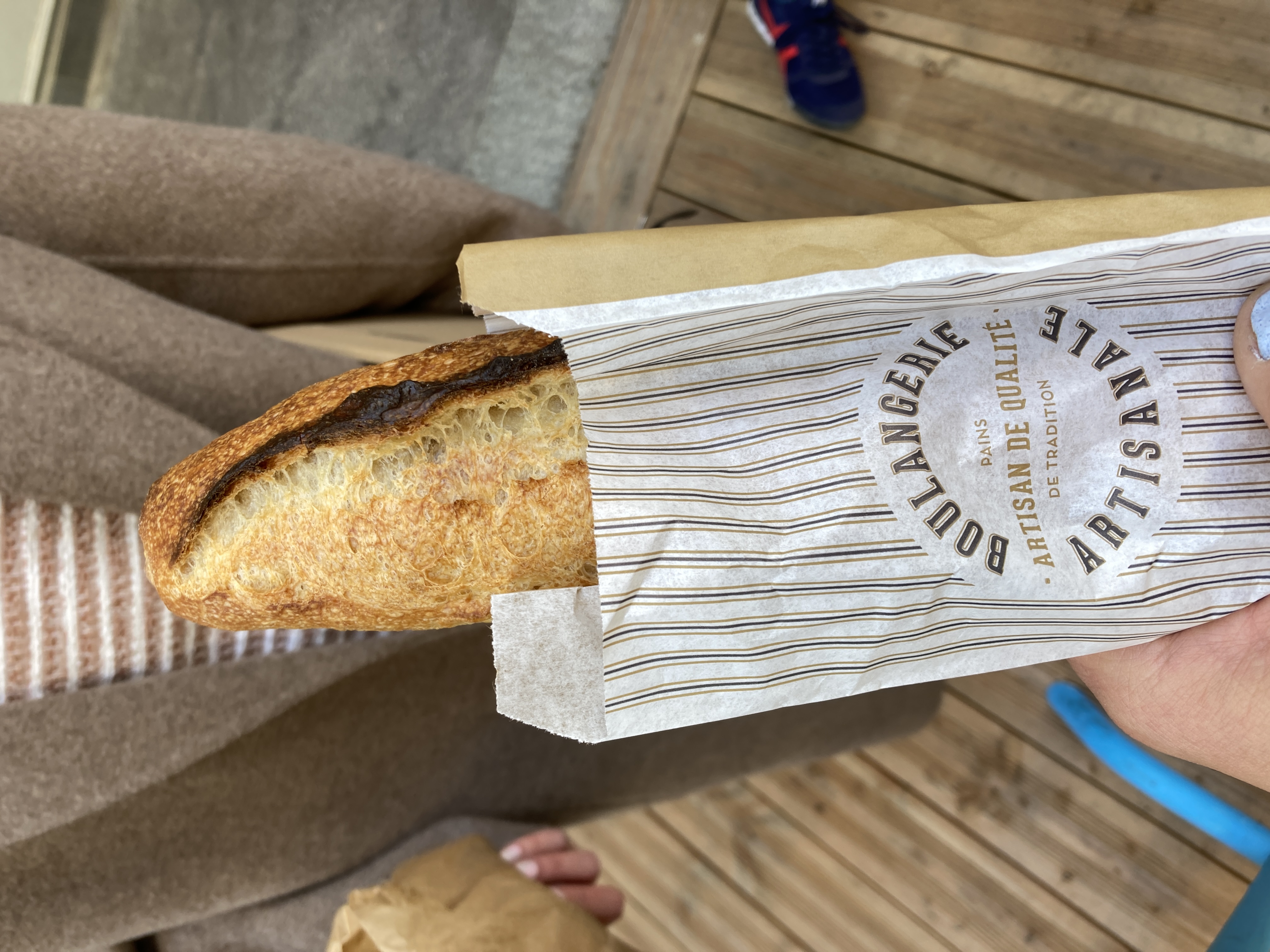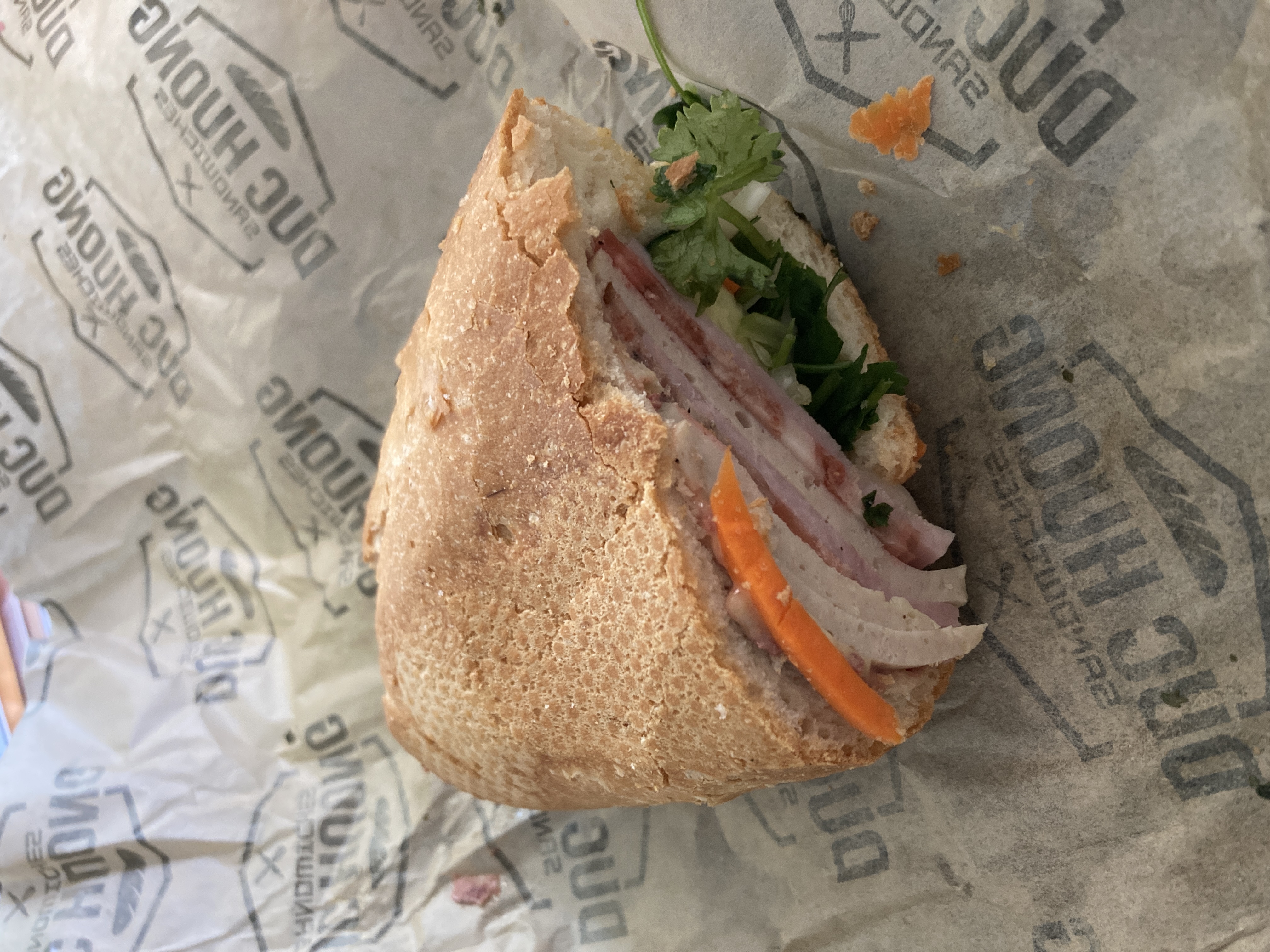bready, set, go (paris series 3, bread culture)
bread culture
One of the biggest things I'll miss in France is the bread culture.
When we arrived at our Paris apartment, our landlord was late, so we were stuck outside with our luggage and dog. Because we had a lot of crap, we were keen on finding something delicious nearby to kill time.
Just down the street from us was a local boulangerie with a hefty wooden table outside. They had what looked to be all the basics. Baguettes, loaves, sandwiches, and croissants.
We opted for a reasonably sounding lunch item, "le sandwich thón", which turned out to be some form of tuna salad jammed in a baguette. It was fantastic.
We were well aware of boulangerie culture in France, but boulangeries are as common as Starbucks and gas stations in the United States. You can hardly walk a block in the city center without running into someone carrying a baguette, eating a baguette, or using a 2-day old baguette as a weapon. 🥖 🗡️
What's not awesome is that baguettes usually get pretty rock hard after 3 or so days because there are no weird additives in the bread (hence the weaponry).
I recall standing in our kitchen bracing myself to cut a baguette to make some toast. The real problem probably wasn't the stale baguette, it was not consuming it all the day we got it.
As a side note, staleness is not dryness (an oft but incorrect assumption) it's a chemical reaction that occurs in the bread. For most sliced types of bread, there are chemicals that prevent this from happening. Luckily for baguettes, you can revive them in the oven with some heat and a dash of water if you're so inclined, or just head to your local boulangerie and buy a fresh one.
My advice is always buy two, one isn't enough. You'll want to take a bite just because it's fresh and then one bite turns into 10, and before you know it, the first baguette is gone before you even get home.
I wouldn't have thought any more about boulangeries until I stumbled upon the fête du pain ("bread party" 🥰) near the Notre Dame in early May. France has bread competitions every year, and the fête du pain looked like a huge marketing convention to spread bread love and encourage local folks to work at boulangeries.

There were opportunities to buy bread baked onsite, listen to a guy scream into a microphone about bread history, see a showcase on the "breads of the world", as well as participate in an entire online job portal featuring official bread jobs. The winner of the annual best baguette competition would also be crowned at this party.
I only knew about the best baguette competition because the first episode of Duolingo's French podcast series was about it. It's awarded to the best baker by year - the 2024 winner was Xavier Nétry at Boulangerie Utopie. I'm no baguette expert, but after having a shit ton of baguettes, we started cueing in on what made a good baguette (an exterior that shatters like a creme brulee topping, an airy but soft chewy crumb, and a seasoned, slightly sour bready taste). Xavier's baguettes at Utopie were waaay too easy to eat. You got the audible crunch, the light sour taste, and the springy, soft fluff of the insides. He apparently used lemon and banana in his sourdough starter (unheard of!). We stumbled across other boulangeries that were well known for their baguettes (2012, 2013, and 2023 winners), which were also good in their own ways. What's awesome about this competition is that the judging is done by a randomly selected cohort of Parisians and professionals. So, if you're Parisian, you could be in for a treat! 😂 What trust.

I signed up to the online job portal just to see what it was all about, and I saw that many, if not all of the job posts were "official" French boulangeries to work at, which led me down a rabbit hole to discover what this "official" thing meant.
Basically, the French have laws to protect consumers and uphold cultural traditions in France, whereas in the U.S it feels like the laws are disguised as consumer protection but are really set up to protect companies. When it's all said and done, the United States still allows a lot more crap to make it into our consumables as compared to the EU (high fructose corn syrup, bleached products, dyes, etc).
In France, "Le Décret Pain" of September 13, 1993 talks about boulangeries:
A boulangerie must bake its bread on the premises where it is sold. If a bakery sells bread made elsewhere, it cannot be called a "boulangerie."
"The primary ingredients for traditional French bread are limited to flour, water, salt, and yeast or leavening. Additives and preservatives are generally not allowed."
"For the famous "baguette de tradition Française," the rules are even stricter. It must not contain any additives, and the dough must be prepared, kneaded, leavened, and baked on the premises."
"The bread-making process must follow traditional methods, including specific kneading, fermentation, and baking techniques."
"Fermentation times and temperatures are regulated to ensure the bread develops its characteristic flavor and texture."
"Boulangeries must accurately label their products. The term "tradition" can only be used for breads made according to the traditional methods."
'The titles "Baker" and "Bakery" may be used only by professional artisans who choose their primary materials, knead their bread, then control both its rising and shaping, and finally bake the bread on the site from which it is sold. The ingredients from which the bread is made must have been neither flash-frozen nor deep-frozen. If this is the case, the shop must instead employ the term "bread store".'
This is serious business. Digging deeper, the French love their bread so much they have to stagger their baker's vacation times.
"A study conducted by the Paris Prefecture and the professional chamber of artisan bakers lists the bakeries district by district, street by street and determines who will leave in July, who in August. Thus, at least one bakery out of two is open in the summer."
Their reasoning?
'This is the "la meilleure façon de défendre l'artisanat" (the best way to defend craftsmanship).'
And,
'"Le pain est un aliment symbolique. Ne pas avoir de boulangerie ouverte à proximité est un vrai problème pour les habitants" (bread is a symbolic food. Not having a bakery open nearby is a real problem for residents).'
This is awesome, and rightly so. Such craft and a call to duty. Who is gonna bake the bread if they're off at some other fête du pain in another country? 😂
Because the label "boulangerie" is highly regulated and protected, it's a label you can't use lightly. This is kind of similar to the States with certain labels like USDA Organic. There's guidelines you have to meet to be able to stick "USDA Organic" on your product, although, in my opinion, it isn't strict enough for certain products. Anything else like "lowers cholesterol", "good for your heart", "lowers blood pressure" is all marketing bullshit. I'm sure the same problem with food labeling exists in France, but this whole "boulangerie" business sounds serious. Maybe if you're not a boulangerie, you should be a "noulangerie" (no bread, just nougat).
So as an example, something like Paul is not a boulangerie, it's a bread company. If the States had a boulangerie law, plenty of places would probably fail - even though they might have "bakery" in the name, what they really are are "bread companies" or "bread distributors". Most of their shit is made or baked elsewhere, and then distributed, maybe heated up. It's not "on the premises". Which comes back to why a boulangerie law helps to stop French breads (and food culture) from falling into a lowest common denominator trap where everything is about profit, which kills mom & pop shops. There's some natural economic limit you hit if you have to produce everything in shop.
So, if boulangeries have strict rules for bread making and what can legitimately be called a "boulangerie", then it makes sense that pâtisseries do as well, just based on the word pattern ... right?
Apparently not. There is no official decree for pâtisseries, only assumed honesty surrounding ingredient use, and a fuckton of training to become a legit pâtissier. 😩
What else has been preserved in France? Another example I observed was the proliferation of independent bookstores. Apparently, in response to online retailing, France required new books to be sold at the same price, no matter the retailer.
The French view local bookstores as important to their communities and don't want large monopolistic companies with economies of scale to undercut small local stores. That basically answered my question of "how do these places stay open?" every time I walked by (non-market forces). Apparently, it has worked so far, since independent bookstores aren't completely shuttered and dead in France. However, I'm sure Amazon EU is alive and kicking, and I haven't seen the numbers, so the story might change as time goes on.
I would love to see more of these long-held cultural celebrations in every community. They focus not on economics of scale and profit-seeking, but more so a celebration of the things they love and the people that support it. For France, it's baked (no bread pun intended) into multiple layers, written law, cultural importance, societal habit, and just straight up deliciousness that extends beyond Parisian residents and benefits visitors like me.
It's this that's inspired me to keep good bread alive in my life. I'm not Parisian, nor am I French, but I am a cook at heart, love food, love the craft of small businesses, and find pleasure in vibing with my local baker / barista / chef, so we can start there.
Boulangerie or not, what I want to cultivate is that element of local routine and deep cultural appreciation that is oft found in France. Similar to how cafés seem to be congregation points for people, boulangeries serve as this too. You'll see the server from across the way grabbing a sandwich for lunch, well dressed students from the makeup university down the street eating croissants, and grandmothers who come at the same time everyday for that special seeded loaf (watch what they buy, and buy the same thing 🧐). Plus, you see the same folks at the counter (be nice to them, they're probably the ones doing some of the baking too). And then there's us too, the visitors with pets. All of it just sounds slow, deliberate, and homey. I encourage you to get involved with your local favorites, wherever you are.
Anywho, to keep good bread alive, you have to actually have good bread, so I've started looking for my favorite baguettes here in the Bay. I generally have them in the morning slathered with some butter from Normandy and flaky salt from Camargue, or split open for lunchtime sandos.
I can't just go to the local boulangerie to see what's good, because there are no boulangeries. Even if it's labeled "boulangerie", the States don't have any laws around that word, so I have to do some research to figure out what they're doing.
A shortlist that I've got around to in the South Bay:
Semifreddis Bakery (from Whole Foods) - tried it, looks and tastes like a baguette, probably fine in a pinch but falls on the harder side of baguettes. No glass shattering exterior and characteristically stale after 2 days like a normal baguette should be. Probably has some distance to travel since it looks like the bakery is in Berkeley. It's $3.50 at the time of writing, which is still almost 3x the price of a baguette in Paris.
Whole Foods Baguette - haven't tried it yet, looks like a baguette and is probably baked at Whole Foods, but I can't be sure. $3.50 a pop.
Trader Joes Baguette - middling, probably not baked onsite, since Trader Joes is a market. It's not the worst bread, but it's definitely not a baguette (visually & taste-wise) despite the name. For some weird reason, it doesn't go stale, and molds after a couple days. I think I'll spend my $2.00 elsewhere.
Midwife and the Baker - I recall trying a baguette a while ago and it being quite good. The outside might not be creme brulee shattering, but I'll need to try it again. At the time of writing it's $5.00 a baguette, but rightly so - it seems they source their own grain, mill their own flour, and bake onsite. That's some serious "défendre l'artisanat" right there.
Manresa - Baguettes look pretty good here, but I can't recall that I've actually tried it. Baking is done in a commissary kitchen and delivered to retail locations. I'm starting to think that baking onsite is actually not that common, especially if you've been successful enough to open multiple locations. Also, savagely $5.00 a baguette. Can I just set fire to my wallet now? Maybe it's worth it, gotta go and try it.
Duc Huong Sandwiches - I live in an area with a lot of Asian food. Don't sleep on Vietnamese baguettes (the Bahn Mi baguette). Because they were once French Indochina for a solid 150 years, they've got some killer bread too. Not 100% like a French baguette but very similar. Duc Huong's got great sandwich deals and the bread that comes with it is pretty fantastic. It's lightly "shattery" on the outside and soft on the inside. The crumb and lack of the honeycomb innards doesn't quite register like a normal baguette, but it's not trying to be a French baguette so whatever. It's a little sweeter, but that's perfect, since it's jammed full of headcheese, cold cuts, and pâte. I think it's $2.00 for a baguette, and it looks like they got walk-in ovens here. ♨️ 😌

Next up is to try some San Francisco based bakeries - anyone interested in doing a baguette super tasting with me?
- Tartine Bakery
- Arizmendi
- Jane the Bakery
- Thorough Bread
- ACME
- La Boulangerie de San Francisco
- Other Bahn Mi places?
Oh, and how could I miss this?
'On Wednesday, November 30, 2022, the United Nations heritage agency (UNESCO), named the baguette something worthy of humanity's preservation, adding it to its exalted "intangible cultural heritage" list.'
🥖
